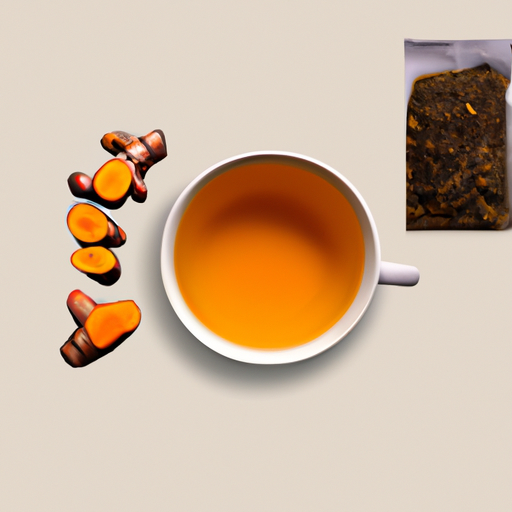Turmeric has a long history in traditional medicine for treating various ailments, and in recent years, it has become popular in the Western world for its potential health benefits.
One of the most common ways to consume turmeric is through either turmeric tea or capsules. But which one is better? Let’s take a closer look at the differences and benefits of each.
I have always been a fan of turmeric and its anti-inflammatory properties, but I was curious to know whether turmeric tea or capsules were the better choice. After doing some research, I discovered that both turmeric tea and capsules have their own unique advantages. It all comes down to personal preference and what works best for your body.
In this article, we will explore the benefits of turmeric, the differences between turmeric tea and capsules, and how to decide which one is right for you.
Key Takeaways
- Both turmeric tea and capsules offer numerous health benefits, including reducing inflammation and aiding digestion.
- Turmeric capsules offer a standardized dosage of curcumin and are more convenient for those who are always on the go.
- Turmeric tea allows for adjusting dosage and mixing with other beneficial ingredients for added health benefits.
- Consultation with a healthcare professional is crucial before incorporating turmeric supplements into your routine to avoid potential side effects and interactions with other medications.
The Health Benefits of Turmeric
If you’re looking to boost your health, turmeric has a plethora of benefits. This yellow spice has been used for centuries in traditional medicine for its anti-inflammatory properties, which can help alleviate joint pain and reduce the risk of chronic diseases.
Additionally, turmeric has been shown to improve brain function, boost immunity, and aid in digestion. While cooking with turmeric can be a great way to incorporate it into your diet, turmeric supplements are also available for those who want to ensure they’re getting enough of this powerful spice.
However, with so many options on the market, it’s important to do your research and choose a high-quality supplement from a reputable source. Now, let’s talk about another popular form of turmeric consumption: turmeric tea.
Turmeric Tea
You’ll be amazed by the numerous health benefits that come with regularly consuming turmeric tea. This warm, soothing drink has been used for centuries in traditional medicine to treat a wide range of ailments.
Turmeric tea is rich in antioxidants, which can help protect your body against damage from free radicals. It also contains anti-inflammatory compounds that can help reduce inflammation throughout the body, which is a common cause of chronic diseases like heart disease, cancer, and diabetes.
To prepare turmeric tea, you can use fresh or dried turmeric root, which you can find at most health food stores. Simply boil a few slices of turmeric root in water for about 10 minutes, then strain the liquid and add your favorite sweetener or milk. You can also add other spices like ginger, cinnamon, or black pepper for added health benefits.
Drinking turmeric tea regularly can help boost your immune system, improve digestion, and even enhance brain function. However, if you’re looking for a more convenient way to enjoy the benefits of turmeric, you may want to consider taking turmeric capsules.
Turmeric Capsules
I personally find that turmeric capsules are a convenient and portable way to consume turmeric. With capsules, I can easily take them on-the-go and not worry about any preparation.
Additionally, the precise dosage of turmeric in each capsule ensures that I’m getting a consistent amount of the beneficial compound curcumin.
Convenient and Portable
Turmeric capsules are a travel-friendly option for those who are always on the go and need a convenient and portable way to consume turmeric. They’re perfect for people who can’t make turmeric tea every day or who don’t have access to a kitchen.
With capsules, you can take your daily dose of turmeric anywhere and anytime, making it easier to incorporate into your routine. The convenience factor of turmeric capsules can’t be overstated. They come in small, easy-to-swallow pills that you can take with you on the go.
You don’t have to worry about measuring out the right amount of turmeric or dealing with the mess of making tea. However, while capsules are a great option for convenience, they may not be the best choice for those who want to have precise dosage control.
Precise Dosage
For those who crave absolute precision in their dosage, nothing beats the accuracy of using a scale and measuring spoons when consuming turmeric. While turmeric capsules offer a standardized amount of curcumin, turmeric tea allows for a more flexible dosage.
However, preparing turmeric tea requires careful attention to timing, as curcumin is only soluble in hot water for a short period. It’s important to add the turmeric to boiling water and let it steep for at least 10 minutes to ensure maximum absorption of its beneficial properties.
It’s also essential to be aware of potential risks associated with consuming turmeric in large amounts. Exceeding the recommended dosage may lead to gastrointestinal issues or interfere with certain medications. Therefore, it’s crucial to consult with a healthcare provider before starting a turmeric regimen.
That being said, turmeric capsules offer a convenient and precise way to consume turmeric without any preparation required.
No Preparation Required
With no preparation required, incorporating turmeric into your daily routine has never been easier. Turmeric tea benefits are numerous and can be enjoyed without the hassle of brewing or mixing. Here are three reasons why turmeric tea is a great option for those who want convenience and health benefits:
- Turmeric tea is available in tea bags, making it easy to brew and drink on-the-go.
- Many people prefer the taste of turmeric tea over capsules, which can have a strong aftertaste or leave a lingering flavor in the mouth.
- Turmeric tea can be mixed with other beneficial ingredients, such as ginger or honey, to create a delicious and nutritious beverage.
When it comes to incorporating turmeric into your daily routine, taste preferences and convenience play a big role. However, it’s important to also consider differences in absorption between turmeric tea and capsules.
Differences in Absorption
When it comes to the differences in absorption between turmeric tea and capsules, there are a few key points to consider.
Firstly, the bioavailability of curcumin, the active ingredient in turmeric, is significantly increased when taken in capsule form due to its ability to bypass the liver.
Additionally, the presence of piperine, a compound found in black pepper, can further enhance the absorption of curcumin in the body.
Overall, it’s important to consider these factors when deciding which form of turmeric to incorporate into your diet.
Bioavailability of Curcumin
Understanding the bioavailability of curcumin is essential for you to make an informed decision about whether to consume turmeric tea or capsules. Curcumin is the active ingredient in turmeric, known for its anti-inflammatory and antioxidant properties. However, curcumin is not easily absorbed by the body due to its poor solubility in water and low bioavailability.
Several bioavailability factors affect the absorption of curcumin. These include the form of turmeric consumed, the dose, and the presence of other compounds that affect its absorption. Research suggests that consuming turmeric with piperine, a compound found in black pepper, can increase the bioavailability of curcumin by about 2000%.
This is because piperine inhibits the enzymes in the liver that break down curcumin, allowing more of it to enter the bloodstream. In the subsequent section, I will discuss the effects of piperine on curcumin absorption and the implications for choosing between turmeric tea and capsules.
Effects of Piperine
In our previous discussion, we talked about the bioavailability of curcumin and how it affects the efficacy of turmeric. Now, let’s delve into the effects of piperine, a compound found in black pepper, on the absorption of curcumin.
-
Piperine enhances the absorption of curcumin: Studies have shown that piperine can increase the bioavailability of curcumin by up to 2000%. This is because piperine inhibits enzymes that break down curcumin in the gut, allowing more of it to be absorbed into the bloodstream.
-
Piperine may have other health benefits: Aside from its ability to enhance curcumin absorption, piperine has been shown to have antioxidant, anti-inflammatory, and anti-cancer properties.
-
Piperine is generally safe for consumption: While high doses of piperine may cause gastrointestinal irritation, it’s generally considered safe for human consumption.
With the help of piperine, turmeric bioavailability can significantly increase, making it a more effective supplement. However, while piperine’s generally safe for consumption, it’s important to note that it may interact with certain medications and should be avoided by pregnant women. Moving forward, we’ll discuss potential side effects of taking turmeric supplements.
Potential Side Effects
Turmeric capsules and tea can both cause potential side effects, including gastrointestinal issues and increased risk of bleeding. While turmeric is generally safe when consumed in moderate amounts, consuming large doses of turmeric can lead to stomach upset, nausea, and diarrhea. Moreover, long-term use of turmeric can cause liver problems, particularly when taken in high doses. Therefore, it’s important to follow the dosage recommendations provided by the manufacturer or a healthcare professional to minimize the risk of adverse effects.
In addition, turmeric can interact with certain medications, such as blood thinners and diabetes medications, which can increase the risk of bleeding and hypoglycemia, respectively. Therefore, people taking these medications should exercise caution when consuming turmeric in any form. As with any supplement, it’s always best to consult with a healthcare professional before starting to take turmeric capsules or tea to ensure it’s safe for you to consume.
With this in mind, let’s now discuss the cost comparison between turmeric tea and capsules.
Cost Comparison
When it comes to comparing the costs of turmeric tea versus capsules, there are a few key points to consider. Firstly, the price per serving can vary greatly depending on the brand and quality of the product.
Secondly, it’s important to assess whether the value for money is worth it, particularly if you’re purchasing turmeric as a supplement for its health benefits.
In this discussion, I’ll be exploring the cost comparison between these two forms of turmeric and what factors to consider when making a decision.
Price per Serving
You’ll save money by choosing capsules over tea in terms of price per serving. Turmeric capsules are available in different affordable options depending on the brand and the quantity.
For instance, a bottle of 60 capsules can cost around $10 to $20, which means that each capsule costs around $0.17 to $0.33. On the other hand, turmeric tea bags can cost around $5 to $10 for a box of 20 tea bags, which means that each tea bag costs around $0.25 to $0.50 per serving.
When it comes to price per serving, turmeric capsules are more cost-effective than turmeric tea bags. However, value for money is not just about the price. The efficacy and benefits of turmeric depend on its bioavailability, which can be influenced by the form, quality, and processing of the turmeric.
Therefore, when choosing between turmeric tea and capsules, it is important to consider not only the cost but also the quality and effectiveness of the product.
Value for Money
In terms of value for money, turmeric capsules may seem more convenient as they’re usually sold in bottles with a set number of servings, making it easier to track expenses. However, it’s important to consider the turmeric dosage in each capsule and the brand options that are available.
Cheaper brands may skimp on the amount of turmeric in each capsule, which can ultimately lead to a lower value for money as more capsules may be needed to achieve the desired health benefits.
On the other hand, with turmeric tea, one can adjust the dosage and tailor it to their individual needs. It may require a bit more effort, but it can also offer a more personalized experience. Plus, there are various brands and blends of turmeric tea available, making it easy to find one that suits one’s preferences.
Ultimately, it’s up to personal preference and budget when deciding between the two options.
When it comes to availability, it’s important to note that both turmeric tea and capsules can be found in most health food stores and online retailers. However, it may be a good idea to check with local stores beforehand to ensure they carry the specific brand or type of turmeric product desired.
Availability
Turmeric capsules are more widely available than turmeric tea bags, making them a convenient option for busy individuals who want to incorporate turmeric into their daily routine. Local availability of turmeric capsules is high as they can be found in most health food stores, supermarkets, and drugstores. Additionally, online options for purchasing turmeric capsules are also abundant, with various websites and online retailers offering different brands and dosages.
On the other hand, turmeric tea bags are not as widely available as turmeric capsules. While some health food stores and online retailers carry them, they may not be as accessible to individuals who live in remote areas or those who prefer to purchase their supplements in person. Therefore, for individuals looking for a convenient option that can easily fit into their daily routine, turmeric capsules may be the better choice.
Personal preferences also play a role in deciding whether to choose turmeric tea or capsules. Let’s explore this further in the next section.
Personal Preferences
Everyone has their own personal preferences when it comes to consuming turmeric. Some people prefer the taste of turmeric tea, while others find it too bitter and opt for capsules. Taste preferences can play a big role in deciding which form of turmeric to take.
However, it’s important to remember that personal preferences shouldn’t be the only factor in choosing how to consume turmeric. It’s important to consult with a healthcare professional to determine the best method for your individual needs and health concerns.
Consultation with a Healthcare Professional
When considering the use of turmeric supplements, it’s crucial to consult with a healthcare professional. This is especially important if you have any medical conditions or are taking any medication. Certain medical conditions, such as gallbladder problems, bleeding disorders, and iron deficiency, may be adversely affected by turmeric consumption.
Additionally, turmeric may interact with certain medications, such as blood thinners and diabetes medications. This can potentially cause harmful side effects. Therefore, it’s essential to seek expert advice before incorporating turmeric supplements into your routine.
Medical Conditions
If you have arthritis, you might benefit from taking turmeric capsules daily, as studies have shown that they can help reduce inflammation and joint pain. For example, my friend’s mother was able to decrease her dependence on pain medication after incorporating turmeric capsules into her daily routine.
Turmeric supplements are available in various forms, including capsules, tablets, and powders. When taking turmeric capsules, it’s important to follow the dosage recommendations on the label or as prescribed by a healthcare professional.
Other medical conditions that may benefit from turmeric capsules include digestive issues, such as irritable bowel syndrome (IBS) and ulcerative colitis. Additionally, turmeric capsules may also have a positive effect on heart health, as they have been shown to reduce cholesterol levels and improve blood flow.
However, it’s important to note that while turmeric capsules may offer health benefits, they should not be used as a replacement for prescribed medication. In the next section, we will discuss potential medication interactions with turmeric.
Medication Interactions
It’s important to be aware of potential medication interactions before incorporating turmeric into your daily routine. While turmeric is generally considered safe for most individuals, it can interact with certain medications and cause potential risks. Some of the medications that can interact with turmeric include blood thinners, diabetes medications, and drugs that lower stomach acid.
To avoid any potential risks, it’s important to consult with a healthcare professional before taking turmeric supplements or incorporating it into your daily routine. They can guide you on the dosage guidelines and potential risks associated with your current medications. Additionally, it’s important to stick to the recommended dosage and not exceed it, as consuming too much turmeric can lead to adverse effects such as nausea, diarrhea, and dizziness. By being informed and cautious, you can safely incorporate turmeric into your daily routine and reap its potential health benefits.
| Medications that can interact with turmeric | Potential Risks | Dosage Guidelines |
|---|---|---|
| Blood thinners | Increased risk of bleeding | Avoid or limit turmeric intake |
| Diabetes medications | Lowered blood sugar levels | Monitor blood sugar levels closely |
| Drugs that lower stomach acid | Reduced effectiveness | Take turmeric supplements 2 hours after taking medication |
Frequently Asked Questions
Are there any interactions between turmeric and prescription medications?
Although turmeric is generally safe, it can interact with certain medications, especially blood thinners. People with diabetes should also be cautious as turmeric can lower blood sugar levels. Consult with a healthcare professional before taking turmeric supplements.
Can turmeric be used as a natural remedy for depression or anxiety?
I’ve found that turmeric tea benefits my mood and reduces anxiety. Research supports the use of turmeric for these conditions, but evidence is limited. Turmeric capsules may also be effective, but consult with a healthcare professional first.
How much turmeric should be consumed daily for optimal health benefits?
For optimal health benefits, daily intake of 500-2,000mg of curcumin, the active compound in turmeric, is recommended. Cooking with turmeric is a simple way to incorporate it into your diet.
Is turmeric safe to consume during pregnancy or while breastfeeding?
As a healthcare professional, I advise caution when consuming turmeric during pregnancy or while breastfeeding. While turmeric tea benefits and turmeric capsules advantages are known, there is limited research on its safety in these populations. Consult with your healthcare provider before consuming.
How does the quality of turmeric supplements vary between brands?
When it comes to turmeric supplements, quality comparison is essential due to brand variations. Brands differ in sourcing, processing, and third-party testing. It’s important to research and choose a reputable brand for optimal benefit.
Conclusion
Overall, both turmeric tea and capsules offer numerous health benefits. Turmeric has anti-inflammatory and antioxidant properties, which makes it a great addition to any diet. However, the best option between the two depends on personal preferences and needs.
If you enjoy the taste of turmeric, then tea may be the way to go. It’s easy to make at home and can be a comforting and soothing beverage. On the other hand, capsules may be a better option for those who want a more convenient and consistent way to consume turmeric.
In the end, it’s important to consult with a healthcare professional before adding turmeric to your diet, especially if you have any medical conditions or are taking medication. But whichever option you choose, remember that turmeric is a powerful spice that can benefit your health in many ways. As the saying goes, "a little bit of turmeric a day keeps the doctor away."










